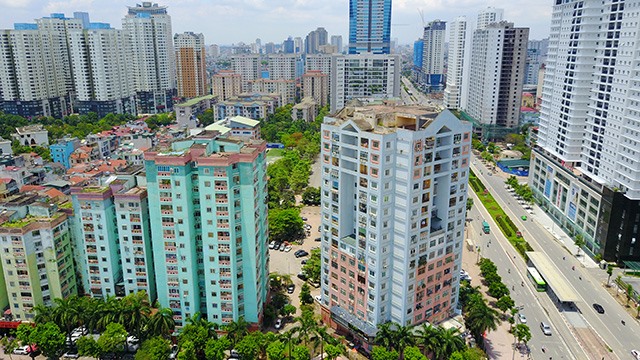 Economy
Economy

 |
| Experts say that Việt Nam needs to come up with policies for developing affordable homes. - Photo danviet.vn |
HÀ NỘI — The real estate market is suffering a severe shortage of affordable homes despite the segment witnessing huge demand, attendees heard at a conference on Thursday.
Expert Đặng Hùng Võ said at the conference held by Dân Việt newspaper that the structure of property products in Việt Nam did not match market demand, especially in Hà Nội and HCM City.
Võ pointed out that the supply of high-end apartments was abundant while there was a shortage of affordable homes.
The Central Institute for Economic Management (CIEM) cited statistics showing that as Việt Nam was undergoing rapid urbanisation, on average around 1 million people migrated from rural areas to big cities like Hà Nội and HCM City each year and the figure is expected to rise further.
This increases demand for affordable homes in big cities. It was estimated that demand for affordable homes accounted for around 60-70 per cent of total market demand, but the supply met less that 20 per cent. Specifically, apartments of less than 60sq.m with prices of less than VNĐ700 million (US$30,500) accounted for just around five per cent of market supply.
Võ said that the Government’s policies for developing social housing projects and affordable homes had failed to raise resources from the private sector.
Many projects had ground to a halt after the VNĐ30 trillion package of preferential loans for social housing development ended, proving that social housing development was still too reliant on Government support.
Võ said that it was important to develop policies to promote the development of affordable homes, rather than social housing development.
CIEM’s Deputy Director Trần Kim Chung agreed, saying that focus should be placed on developing affordable homes.
He pointed out current regulations had not allowed for the development of small apartments, which was hindering the development of affordable homes. This issue was made worse by difficulties in accessing credit, complicated procedures and a lack of land available for construction.
Chung said that Việt Nam needed to have appropriate policies in land, tax, interest rates, credit and mortgages for affordable home development together with allowing the development of apartments of different sizes to meet demand.
He stressed that developing affordable homes is a pressing issue for Việt Nam as rapid urbanisation were putting pressure on city infrastructure, such as power grids, water networks and schools.
According to Nguyễn Văn Đính, general secretary of the Việt Nam Association of Real Estate Brokers, due to a lack of infrastructure, such as transport, schools and retail outlets, many affordable housing projects were not attractive to buyers.
Đính said that the development of affordable housing projects must be synchronised with the development of urban infrastructure to encourage people to buy and live in areas which were far from the city centre. “Affordable does not mean poor quality.”
Policies for developers and low-income earners to buy affordable homes should also be devised, together with the development of land available for building affordable housing projects.
In addition, it was necessary to develop affordable homes for lease, Đính said.
Vũ Văn Phấn, Deputy Director of the Ministry of Construction’s Department of Housing and Real Estate Management, said that developers were still not interested in developing affordable homes and they expected to be provided with more incentives. However, the Government could not provide too much financial support for developers of affordable housing projects, given the limited budget, he said.
The ministry’s statistics showed that by 2020, around 1.7 million people were in need of homes in urban areas together with 1.7 million workers demanding stable accommodation, requiring the development of nearly 1 million apartments. — VNS




